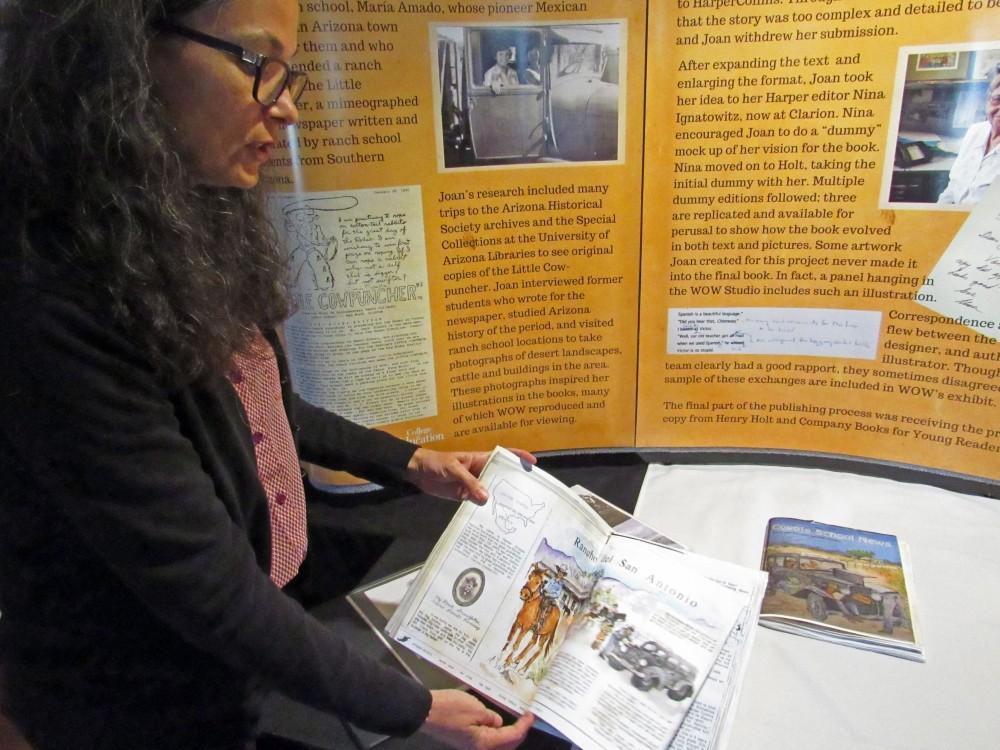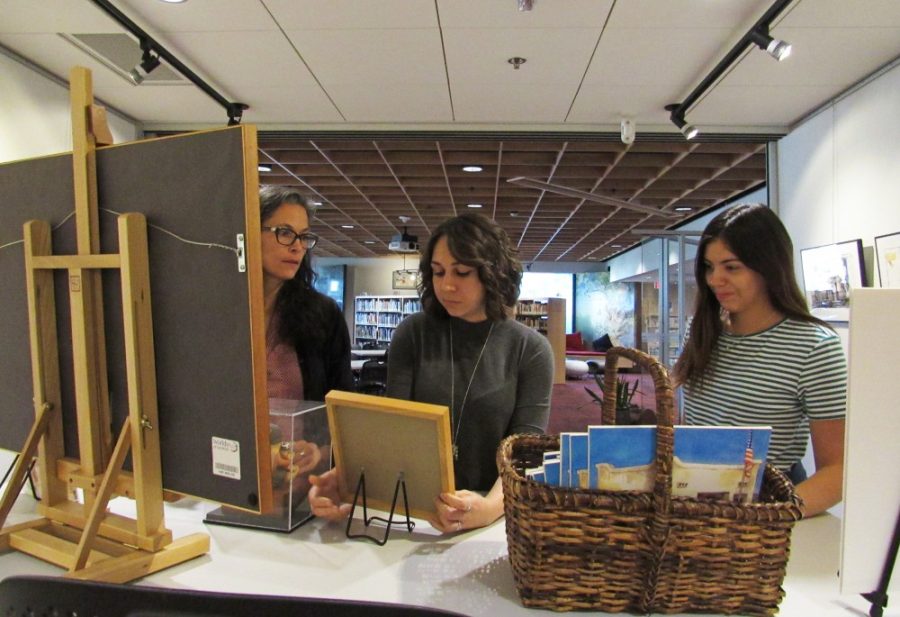(left to right) Rebecca Ballenger, intern Samantha Verini and volunteer Daisy Esquivel work at the Worlds of Words global literature research center. The center, which hosts a rich collection of children’s and young adult’s books from around the world, serves as a valuable resource for educators, current and future alike.
There are a lot of hidden gems at the University of Arizona, but what most people don’t know is that the fourth floor of the College of Education building houses the United States’ largest collection of global children’s literature, estimated at about 40,000 books, known formally as Worlds of Words.
Kathleen Short is the director of WOW, as well as a professor focusing on global children’s and adolescent literature here at the UA. She is an avid booklover and started this program because of her innate desire to show children here in the U.S. about what it means to be a global citizen.
“Because a lot of the work I was doing internationally with schools around the world, something that I became very aware of was how much children in other countries were aware of the world than we are here in the U.S.,” Short said.
RELATED: Things to read that aren’t textbooks
The WOW collection includes books from all different countries and continents. There are sections for LGBTQ+, in-state Arizona literature and even the honors books from the International Board on Books for Young People’s Honour List from the past two years.
The WOW collection is more than just books, though; it’s a culturally significant and one-of-a-kind space. Right at the entrance is a a donor wall of characters and animals by illustrator and professor David Christiano.
His work is displayed throughout the collection. All of the books have covers and art, and Rebecca Ballenger, associate director of WOW, spoke to how important art is to the collection and each of the stories.
Also featured at WOW is the Mary J. Wong Collection. Wong was a librarian in Phoenix who wrote many grants in order for illustrators and authors to visit not only her school, but others around the area. Most of the artwork featured in WOW was donated by Mary J. Wong.
RELATED: Highlighting UA employees after Forbes recognition
The books featured from Wong’s collection include first additions, signed books and artwork that she acquired through these author and illustrator visits. One of the featured art pieces is Molly Idle’s “Flora and the Penguin” book and colored pencil illustrations. Idle is a former Dreamworks illustrator.
“The space is just always open, that’s important to us, the nine to five,” Short said. “It is a way to visibly welcome people into the College of Education, but in a space that is visually appealing. It means something, it’s not just pretty. It is a space that has an important educational mission.”
Although the space is kid-friendly, with events hosted specifically for children, the main purpose of the collection is research. Some of the books are not for young people to read because they are unable at their age to discern whether or not books are culturally authentic.
“You have to be a certain kind of discerning reader to know, ‘Is what I am seeing authentic to the culture and it is written by somebody who is part of that culture, or is it inauthentic and perpetuating stereotypes?’” Ballenger said.
According to Short, WOW has books that perpetuate stereotypes, and they are an integral part of the collection, because anyone can examine how these books differ from the culturally authentic stories and see why perpetuating stereotypes can be dangerous.
WOW is mainly used for research purposes, but they host about 150 events a year, which is about two a week. This includes classes, fiestas, the WOW Teen Ambassador Program, school field trips, book exhibits, author visits and much more.
The WOW mission statement, according to their website, is: “Worlds of Words is committed to creating an international network of people who share the vision of bringing books and children together, thereby opening windows on the world. We encourage thoughtful dialogue around global literature so that children can reflect on their own cultural experiences and connect to the experiences of children across the globe.”
The current exhibit in the collection is “Visual Narratives: Connecting Across Languages and Cultures,” which is based on a traveling exhibit from Italy, inspired by language barriers from refugees. Although some places around the world refer to these books as “wordless” or “silent,” WOW emphasizes the term “visual narrative” to refer to the books as what they are instead of what they are lacking.
WOW also has its Teen Ambassador Program, a high school program that invites readers from all over the Tucson community to explore young adult literature as well as build college connections and experiences they may not have had otherwise. The program for this school year just began on Saturday, Aug. 17.

“I really enjoy the idea of reaching out to my community and talking to them about books and things I like,” said George Ballenger, a returning WOW Teen Ambassador.
George Ballenger mentioned how the teens are in charge of getting more books out into the community as well as learning more about literature that relates to students in high school.
“We are working really hard to be both an integral part of the university, the Tucson community, as well as reach out globally,” Short said.
WOW contributes to increasing the understanding of cultural diversity and adheres to their mission statement through the application of what are called Language and Culture Kits.
The kits include books from a specific culture as well as interactive activities, artifacts, lesson plans and resource notebooks for how to teach children about the specific cultures with sensitivity. This enables children to build connections between themselves and other cultures around the world instead of alienating them.
“It can be a little dangerous to talk about global children’s literature if you’re focused on surface culture,” Ballenger said. “Surface culture includes the things that we learn first about other groups, like the flags, famous people, the fashion, the fiesta and the food. So if you give a kid who is not Korean, who has never had kimchi before, they are going to say it is unusual, it’s different. You have the potential to otherize them. But if you give a Korean child some of the things Americans eat, they would have a similar reaction.”
According to Gudrun Godare, WOW volunteer, the kits range from South American to Asian, European, African and many more cultures from around the globe. Teachers from schools around the Tucson community request the kits and WOW volunteers deliver them to schools free of charge.
“I walked in here and literally started to cry. This collection is an amazing collection of global literature,” said Cynthia Ryman, a librarian who is pursuing her Ph.D. in education and working with the Teen Ambassador Program. “To me, it just epitomizes what I want to be about. It’s expanding people’s understanding of themselves through understanding others.”
Follow The Daily Wildcat on Twitter









